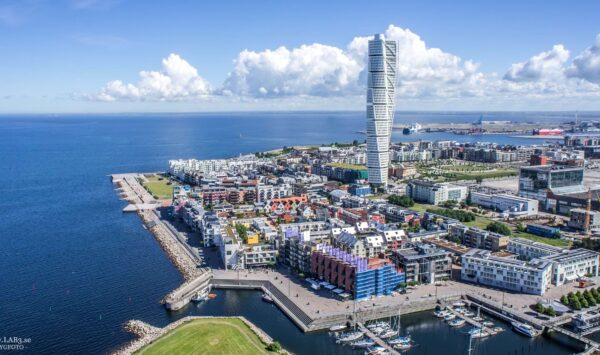Hello Europe, Sweden is gearing up in full steam to welcome the Eurovision bandwagon along with its glam, glitz and glitter for the seventh time in ESC history. The country has kicked off preparations for the upcoming 2024 Eurovision Song Contest. How many countries will compete in the contest next year? Will there be any new countries joining the club? Will we see any returning nations? Will there be any withdrawals? Let’s check out who’s heading to Malmö next year….
Circa 40 countries are expected to partake in the competition next year in the Sweden. The maximum number of countries permitted to compete in next year’s contest is 44, whilst the Grand Final will feature a maximum of 28 nations battling for the coveted Eurovision trophy. A maximum of 38 countries will battle in one of the two semi-finals.
10 countries from each semifinal will proceed to the Grand Final, thus 20 nations will join the 2024 Eurovision winning country, Sweden and the Big Five (Spain, United Kingdom, Germany, Italy and France).
A total of 37 countries have confirmed their participation at the forthcoming 2024 Eurovision Eurovision Song Contest in Malmo, Sweden.
The deadline for broadcasters to apply for participation concluded on 15 September 2023 whilst grace period for applicant countries to withdraw their application without facing a financial penalty concluded on 11 October 2023.
This article will be updated constantly in the lead up to the EBU’s official announcement of the 2024 Eurovision list of participating countries.
Will we see any debuts in 2024?
It is highly unlikely that we will see any new countries debuting in Sweden. Both Kosovo and Kazakhstan are keen to enter the competition but do not comply with the EBU’s rules and regulations in order participate in the contest.
Liechtenstein
Liechtenstein‘s national broadcaster 1FL TV is not an EBU member therefore it is not eligible to take part in the contest. The national broadcaster 1FL TV confirmed to ESCToday that it will not debut at the 2024 Eurovision Song Contest, thus ruling out potentially joining the EBU in the near future.
Kosovo
Kosovo is not a member of the ITU (International Television Union), one of the key requirements to become an active EBU member. Thus RTK is not an EBU member and is currently ineligible to join the contest. The country is neither a member of the United Nations or the Council of Europe. The Eurovision Song Contest has been broadcast live in the Balkan country in recent years.
Kazakhstan
Kazakh broadcaster Khabar Agency is an associate EBU member since 2016 and thus NOT ELIGIBLE to participate at the Eurovision Song Contest, Kazakhstan has to be formally invited by the EBU to join the competition. It is entirely up to the EBU’s discretion to extend an invite to the country very much like in the case of Australia. The Kazakh broadcaster has been airing the contest for the past years.
Kazakhstan debuted at the 2018 Junior Eurovision Song Contest in Minsk and has competed in the competition five times.
Will we see Australia at Eurovision 2024?
The ultimate Aussie Eurovision dream saw the day of light back in 2015 when our neighbours down under were invited to partake in Europe’s favourite television show in Vienna. 2019 saw Australia holding a full fledged national final in order to determine its Eurovision hopeful, thus celebrating its fifth consecutive Eurovision participation. The Aussies continued with their national final in 2020 and 2022.
Until now SBS had to wait for an invite from the EBU and host broadcaster in order to participate in our beloved song contest, on a year to year basis. This was no longer be necessary until 2023 as SBS Australia and the EBU sealed a five year deal enabling the country to compete in the song contest for five years. This deal concluded in 2023 and we are yet awaiting to see how the EBU and Australia will proceed from here, if another deal will be sealed, if a year by year invite is extended, or if Australia will be granted a permanent place in the competition.
The Eurovision Song Contest’s Reference Group (the governing body of the competition on behalf of the competing broadcasters) approved the decision to grant Australia and SBS the right to participate at the Eurovision Song Contest for the next five years, thus securing participation in the competition until 2023.
Australia was invited to participate at the 2015 Eurovision Song Contest in Vienna as a one off occasion, but our neighbours down under embraced the contest with such enthusiasm they were invited back again in 2016, 2017, 2018, 2019, 2020, 2021, 2022 and 2023.
The Aussies have won the hearts of Eurovision fans near and far, achieving 5 Top 10 placings in their short eight year Eurovision history.
[UPDATED 04 DECEMBER 2023]– SBS and Australia have been invited by the EBU to participate at the 2024 Eurovision Song Contest.
Will there be any returning countries?
Luxembourg will be returning to our beloved competition, after a 30 year hiatus
Who will not return?
Belarus, Russia, Andorra, Slovakia ,Monaco, Bosnia & Herzegovina, Hungary, Turkey, North Macedonia, Montenegro, Bulgaria, Romania and Morocco will not be competing at the 2024 Eurovision Song Contest.
- Belarus-Belarusian national broadcaster, BTRC, has been expelled from the EBU and is thus ineligible to join the competition next year. Hence we will not see Belarus compete at Eurovision 2024.
- Slovakia– RTVS has confirmed to ESCToday that it does to plan to return to the competition in 2024 but is considering a potential return to the competition in 2025.
- Morocco debuted at the Eurovision Song Contest in 1980 and has not competed since, we don’t expect the Northern African country to compete in the contest next year either.
- Russia was set to compete at the 2022 Eurovision Song Contest in Turin but was excluded from partaking in the competion by the EBU in the wake of the latest events in Ukraine. The Russian broadcasters have been suspended from the EBU. Hence we will not see the country returning to the competition next year either.
- Bosnia & Herzegovina will not return to the competition next year either, BHRT confirmed the sad news to ESCToday. The Balkan country last graced the competition in 2016 and has not competed since due to a financial embargo implemented by the EBU due to its debt and the country’s host broadcaster has been afflicted with hefty financial contraints.
- Andorra will not return to the competition in 2024 either. The landlocked nation withdrew from the competition in 2010 and has not returned since. The Andorran national broadcaster, RTVA, confirmed to ESCToday that the country will not participate at the 2024 Eurovision Song Contest.
- Montenegro will not return to the competition in 2024 either. The Balkan country withdrew from the contest in 2023 and will be absent from the event for a second consecutive year.
- Monaco will not return to the contest next year either. The microstate withdrew from the competition in 2007 and has not returned since. The last time Monaco competed at the Eurovision Song Contest was in 2006, back then the Monegasque national broadcaster TMC was responsible for the microstate’s participation at Eurovision. In recent years TMC merged into French broadcaster TF 1 and is no more a member of the EBU. MMD is an active member of the EBU and thus is eligible to partake in the competition. On September 1st TVMONACO was launched in Monaco and the television channel is under the umbrella of MMD is thus eligible to partake at the Eurovision Song Contest if it wishes to.
- Hungary decided to withdraw from the competition in 2020 and has not returned since. The country’s return to the competition in 2024 is not likely either.
- Turkey withdrew from the event in 2013 citing that it did not agree with the new rules of the competition and has not returned since. We do not expect to see Turkey returning to the contest next year either.
- North Macedonia withdrew from the competition in 2023 and will not compete at the forthcoming 2024 Eurovision Song Contest. The country will be absent from the competition for the second consecutive time.
- Bulgaria withdrew from the competition in 2023 and will not compete at the upcoming Eurovision 2024 edition in Malmo, Sweden. The country will be absent from the competition for the second consecutive year.
- Montenegro withdrew from the competition in 2023 and will not participatate at the 2024 Eurovision Song Contest in Sweden. The Balkan country will be absent from the contest for the second consecutive year.
- Romania has decided to withdraw from the competition after been given an extension by the EBU. The country has been forced to withdraw due to financial issues.
Who will withdraw?
Initially all 37 nations who attended the 2023 Eurovision Song Contest are expected to partake in the competition next year along with Luxembourg. [UPDATE] Romania’s participation remains an incognito as the country’s national broadcaster is still in talks regarding its Eurovision 2024 participation. The EBU has given an extension to TVR in order to work out its budgetary issues and resolve its financing if it were to compete at Eurovision 2024. [UPDATE] On 25 January TVR officially confirmed that Romania will not participate at the 2024 Eurovision edition due to financial constraints.
Confirmed countries
- Sweden
- Cyprus
- Finland
- Spain
- Luxembourg
- Norway
- Netherlands
- Israel
- France
- Denmark
- Moldova
- Austria
- Ireland
- Germany
- Estonia
- Italy
- Azerbaijan
- Lithuania
- Serbia
- Iceland
- Switzerland
- Portugal
- San Marino
- Belgium
- Malta
- Ukraine
- Albania
- Latvia
- Croatia
- Greece
- Georgia
- Poland
- Czechia
- Slovenia
- United Kingdom
- Armenia
- Australia
Will not return
- Russia
- Belarus
- Morocco
- Slovakia
- Bosnia & Herzegovina
- Andorra
- Monaco
- Montenegro
- Turkey
- Hungary
- North Macedonia
- Bulgaria
- Romania
Will not debut
- Liechtenstein
- Kosovo
- Kazakhstan
The 2024 Eurovision Song Contest is scheduled to be held on 7, 9, 11 May at the Malmö Arena in Malmö, Sweden.
Source: ESCToday
Photo credit: EBU/BBC




